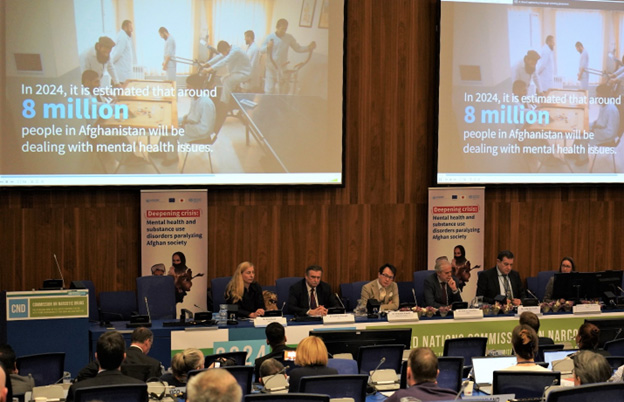 Panel discussion during the "Deepening crisis: Mental health and substance use disorders paralysing Afghan society" side event at the 67th session of the CND. Photo credit: EU/Karolina Lagiewka
Panel discussion during the "Deepening crisis: Mental health and substance use disorders paralysing Afghan society" side event at the 67th session of the CND. Photo credit: EU/Karolina Lagiewka
25 March 2024, Vienna, Austria – Panellists, policy-makers and stakeholders convened on 21 March 2024 to address the pressing challenges around mental health and substance use disorders faced by millions of Afghans.
WHO, the United Nations Office on Drugs and Crime (UNODC), the European Union (EU) and the Government of Japan convened the high-level side event titled “Deepening crisis: Mental health and substance use disorders paralysing Afghan society” during the 67th session of the Commission on Narcotic Drugs. The hybrid event was attended, in person and via Zoom, by 140 participants in total.
Panel members shared insights on how to address gaps in access to and provision of mental health and substance use disorder treatment and care services in Afghanistan through policy changes, enhanced responses, and operational strategies. The discussion highlighted the urgent need for concerted action to tackle stigma and discrimination around people with drug use disorders and mental health problems. Other obstacles include the limited availability of quality and complete prevention and treatment services; insufficient specialized and competent health staff; and considerable funding gaps.
WHO Regional Director for the Eastern Mediterranean Dr Hanan Balkhy highlighted: “An alarming 50% of Afghanistan’s population grapples with psychological distress, which affects productivity as well as quality of life. This renders people vulnerable to mental health and substance use disorders, yet only limited support is available through the country’s health and social care systems. WHO has been partnering with the European Union and the United Nations Office on Drugs and Crime since 2023 to provide services to people with mental health and substance use disorders through 20 facilities and 23 outreach teams across Afghanistan. Since the start, this joint project has spearheaded initiatives to deliver services at every level, from the community to specialized facilities.”
Mr Jean-Luc Lemahieu, Director of the Division for Policy Analysis and Public Affairs at UNODC, emphasized: “Supporting poppy farmers with alternative livelihood options, alongside robust, evidence-based public health measures for treating people with drug use disorders, is imperative to achieve sustainable solutions for Afghanistan.”
At the global level, Mr Peteris Ustubs, Director at the European Commission’s Directorate-General for International Partnerships, highlighted the EU’s ongoing efforts in “strengthening the policies and measures on mental health, as well as drug demand reduction, through their integration in the national social or health systems”.
Ms Raffaella Iodice, EU Chargé d’Affaires a.i. to Afghanistan, added: “Prioritizing investment in mental health and drug use disorders globally and in Afghanistan is a joint responsibility requiring a collaborative effort to achieve greater efficiency and maximize impact on the health and well-being of millions of affected people and their families and communities.”
She further stressed: “Our interventions need to be evidence-based and grounded in good practices and lessons learned. Here I stress the critical role that civil society and local communities play to ensure that solutions are not only tailored to the specific contexts and needs and culturally appropriate but are also, in the long run, more sustainable.”
“Ensuring the health and happiness of individuals amidst drug- and mental health-related challenges in Afghanistan requires collective action and partnership,” said Mr Nobuyuki Kikuchi, Minister-Counsellor of the Permanent Mission of Japan to the International Organizations in Vienna. “Swift and effective measures are imperative. By leveraging comparative advantages and fostering synergies, we can strengthen communities where individuals struggling with drug use disorder and mental health find support and hope. Let us unite in our commitment to combat this issue, prioritizing mental health and well-being for all.”
Dr Vail Al-Raas, Mental Health and Psychosocial Support Coordinator, International Medical Corps – Afghanistan, said: “It is essential to prioritize the allocation of sustainable funds that tackle substance use and mental health programmes, taking into consideration the importance of having comprehensive mental health and psychosocial support rehabilitation programmes in place to ensure overall positive impact.”
The event ended with a call to action urging stakeholders to collaborate to implement evidence-based solutions and advocate for transformative changes to support mental health and substance use disorder treatment and care services in Afghanistan.
Follow @WHOAfghanistan, @UNODC_COAFG, @UNODC_PTRS, @EUinAfghanistan and @JapanGov on Facebook and X (formerly Twitter) for updates and further discussions.
For more information, please contact:
Joy Rivaca Caminade, Head of Communications, WHO Afghanistan
Email:
Nourhan El-Nagdy, Donor Communication Officer, WHO Afghanistan
Email:
Tim Gillmair, Press and Information Officer, EU Delegation to Afghanistan
Email:
UNODC Prevention, Treatment and rehabilitation Section,
Drugs, Laboratory and Scientific Services Branch (DLSSB)
Email:
UNODC press team
Email:








